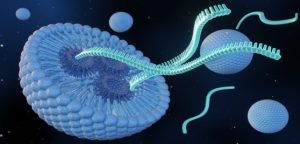Niren Murthy of the University of California, Berkeley, Wang Aijun of the University of California, Davis, and others published a research paper titled: Acid-degradable lipid nanoparticles enhance the delivery of mRNA in the Nature sub-journal Nature Nanotechnology.
This study developed an acid-degradable linker named azido-acetal and used it to synthesize a biodegradable polymer composed of polyethylene glycol lipids, anionic lipids, and cationic lipids. Degraded lipids, and based on this, LNPs (RD-LNPs) that were rapidly hydrolyzed in endosomes were synthesized. In in vitro and in vivo experiments, RD-LNP significantly improved the performance of LNP-mRNA complexes, delivering mRNA to the liver, lungs, spleen and brain of mice more efficiently than traditional LNP, as well as to hematopoietic stems/progenitors in vitro in cells.
Given the pH gradient between endosomes and blood, acid-degradable lipids (ADL) have great potential in generating RD-LNPs. For example, the pH of early endosomes is 6.0, the pH of late endosomes is 5.0, and the pH of blood is 7.4. Therefore, developing ADLs and using them to prepare RD-LNPs has attracted great interest among researchers. ADL has been synthesized through linking methods such as vinyl ethers, n-esters, ketol alcohols, acetals, and hydrazines, and has been incorporated into liposomes, cationic liposomes, and LNPs with encouraging results.
However, existing ADL degrades within days in the pH range of 6.0–6.8 and within hours in the pH range of 5.0–6.0 and is therefore transported to lysosomes for degradation. Developing ADL that degrades rapidly around pH 6.0 has been a challenge. The hydrolysis rate of traditional acid-degradable linkers is proportional to the hydrogen ion concentration, so linkers that hydrolyze rapidly at pH 6.0–6.8 are also unstable and difficult to use at pH 7.4.
In this latest study, the research team developed an acid-degradable linker that can be hydrolyzed within minutes in endosomes but is stable for 21 days at pH 7.4. The azido-acetal linker consists of a benzaldehyde acetal with an azide group in the para position, which is hydrolyzed by a two-step mechanism requiring reduction and acid hydrolysis. This two-step hydrolysis mechanism gives azido-acetal unique stability and rapid hydrolysis capabilities at mildly acidic pH.

Due to the weak electron attraction properties of azido, the hydrolysis rate of azido-acetal is slow, which enables the synthesis of ADL in high yields in an aqueous environment and its incorporation into LNPs. Before administration, azido-acetal will be reduced to amine by adding thiol. This reduction accelerates the hydrolysis rate of azido-acetal because amine has strong electron-donating properties.
The research team demonstrated that azido-acetal linkers can be used as a platform to generate RD-LNPs and further demonstrated that RD-LNPs are effective in delivering mRNA to the liver, lungs, spleen, and brain of mice, as well as to hematopoietic stem/progenitor cells (HSPCs) in vitro. It is better than traditional LNP in many aspects. For example, RD-LNP designed to deliver mRNA to the lungs successfully rescued mice from acute lung injury by delivering IL-22 mRNA, whereas conventional LNPs were unable to do so. In addition, RD-LNP containing high levels of PEG modification efficiently delivered Cas9 mRNA and gRNA into brain tissue, and the number of gene-edited brain cells was 5 times higher than that using traditional LNP. Overall, this study demonstrates that engineering LNP hydrolysis rates in vivo has great potential to expand the use of LNPs in medicine.
Creative Biolabs offers custom mRNA delivery vector services, addressing key challenges in delivering mRNA therapeutics. We specialize in various delivery systems, including lipid-based vectors, polymer-based vectors, hybrid vectors, and enveloped virus-like particles (eVLPs). These systems are designed for applications in areas like gene therapy and vaccines, offering stability, efficient cellular uptake, and minimized toxicity.
